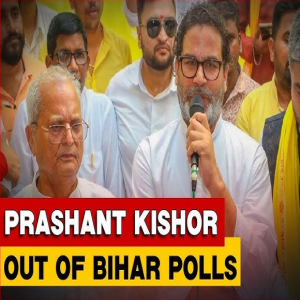
.png) Robert Clements
Robert Clements
.png)
As I look at the Bihar election results, I am not going to spend time on the poor show by the opposition. I have always maintained that unless the Congress and other parties pull up their socks and come up with a clear agenda for progress, they will continue to struggle.
An agenda cannot be built only on the idea of pulling down Modi.
That is not a policy. That is not a plan.
But let me turn to someone who deserves a little more attention. Prashant Kishor. Now, here is another kettle of fish entirely. For years, we have heard about this master strategist, the man behind the scenes who whispers into the ears of leaders, telling them which caste block to lean on, which community grouping to court, which doorstep to knock on and which slogan to chant. He created an aura around himself, and much of the country believed that this man understood the pulse of India.
Then, suddenly, he decided to step out of the shadows, form his own party, and stand before the very people he claimed to understand so well. And what happened? A complete washout.
Not even a small corner of Bihar decided to give him a chance.
It reminds me of something that happened in Mumbai a few decades ago. A newspaper distributor who controlled a major part of the distribution network decided that, since he delivered the newspapers, he could very well publish his own.
He believed that the power lay in the hands that carried the bundle, not in the minds that created the content. So he launched his own paper and waited for Mumbai to cheer. Within a year, the paper folded up. Vendors cannot make headlines. Delivery boys cannot write editorials. And a distribution network cannot replace the trust and talent that go into real journalism.
Why did the paper collapse? Because what matters is content. It always has and always will. And that is precisely the lesson Prashant Kishor should learn from this election. The Indian voter is not a pawn on a chessboard. He is not a numbered statistic in a caste ledger. She is not a community block you move from one column to another. The voter thinks. The voter feels. The voter judges. And above all, the voter chooses.
Kishor assumed that strategy alone wins elections. Bihar has shown him otherwise. A strategist can design a campaign, but he cannot manufacture trust. He can draw charts and create slogans, but he cannot create a connection with people by simply declaring that he knows best.
Until our opposition stops treating elections as clever games of combinations, of hurried alliances stitched only to topple others, and instead treats voters as thinking individuals, the ballot box will keep reminding them with painful clarity the very truth the newspaper vendor turned publisher discovered to his chagrin years ago: without real content, you lose...